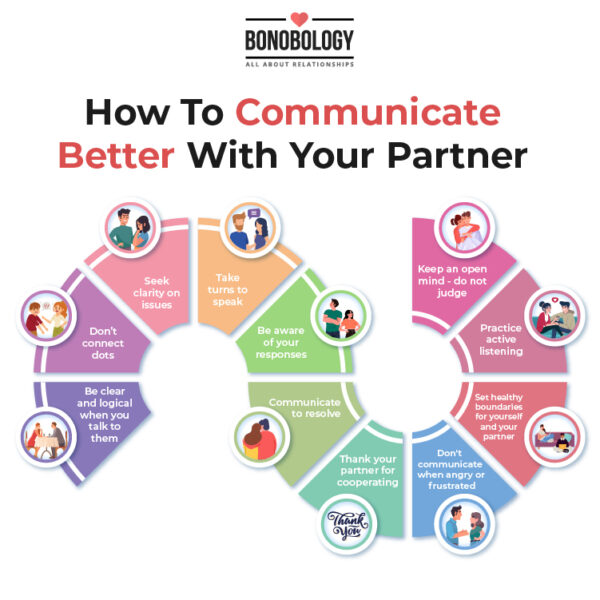When two people come together to share their lives, be it for the interim or the long-haul, it is only through honest and open communication that they can succeed in building a bond that allows them to stick together through the thick and thin. Even so, a lack of communication in relationships remains a persistent and common issue. We asked psychologist Kavita Panyam for her take on communication problems between couples. While communication problems in relationships may be common, they don’t have to be permanent. You can resolve them and start talking about things that matter by identifying the cause of the problem and then working toward a solution. Read on for expert insights.
5 Common Communication Problems In Relationships
One doesn’t need to be a relationship expert to understand the vitality of healthy communication in a relationship. The kind that extends beyond superficial conversations or light-hearted banter. However, this healthy communication often becomes obstructed and stunted for a sizeable majority of couples. From inherent inhibitions to relationship issues harbored over time, the reasons for this can be varied. But the impact is always the same – struggling to communicate in a relationship begins to eat into your bond, slowly but surely. This can cause romantic partners to become absolutely out of sync with each other. To a point where coexisting begins to seem implausible. To prevent that from happening, you must understand the causes of lack of communication in a relationship. These 5 most common communication problems in relationships offer some insight:
1. Stopping communication to avoid issue redressal
One of the most common communication problems is a tendency to stop interacting when uncomfortable issues crop up. Often, people tend to sweep uncomfortable conversations under the carpet, hoping that the issues will resolve on their own. Or that they’ll get over things that are bothering them. However, this kind of denial or avoidance only leads to resentment building up over time. When communication stops in a relationship about the things that matter, such inaction can eventually erode the bond that binds the two partners together.
2. Expecting a partner to read your mind
We have all been there or at least seen this happen around us all the time. One partner has a certain expectation from the other, and they just assume that they’d know it. Or one partner is upset or hurt by something that the other has done, and they expect their SO to just know what is wrong. This assumption that your partner will be able to read your mind is among the most common communication problems in relationships that can open the floodgates for fights and arguments. To communicate better in relationships, both partners have to shed their inhibitions and convey even their baseline needs, expectations and state of mind to each other.
3. Communicating to win
This tendency is most commonly seen during arguments and fights. In most cases, partners begin to see each other as adversaries when standing on the opposite sides of an issue. With egos at play, communication becomes focused on proving oneself right and winning the argument. Whereas the endeavor should be to resolve the conflict and find a middle ground. As this tendency repeats itself over and over again, the communication gap in the relationship continues to widen.
4. A lack of curiosity
One of the most common communication problems in relationships that often goes unnoticed, and hence unaddressed, is a lack of curiosity. When two romantic partners have been together for a long time, they begin to operate with an assumption that they already know everything about each other. This kills curiosity in the relationship and diminishes meaningful communication. You no longer ask your partner interesting questions to get to know each other on a deeper level. When that happens, not only does the communication become stunted but the relationship becomes stagnant too.
5. An unpleasant tone of voice
‘It’s not what you said but how you said it.’ You must have heard this common refrain come up in situations when two people are trying to get past a communication impasse. It’s an undeniable fact that we communicate as much with our body language, gestures and tone of our voice as we do with our words. When the tone or posturing is hostile, the doors of communication close up automatically.
11 Ways To Overcome Communication Problems In Relationships
Can you identify with these common communication problems in relationships? It’s only natural that you’d want to learn how to break this cycle and communicate better with your partner. Given that healthy communication is that one asset with which you can learn to navigate the emotional baggage of expectations, past experiences, perceptions and desires, it is certainly a step forward in the right direction. Kavita gave us some solid tips on ways to improve communication in a relationship. Here are the 11 techniques she recommended to overcome communication problems in relationships:
1. Use clear and simple language
Kavita believes that keeping the discussion pointed, direct and simple is the best recourse when a couple is struggling to communicate in a relationship. Often, the communication gap can be widened if people involved in the conversation convey their thoughts in ambiguous or vague terms. This leaves room for innuendos and drawing meanings that were not intended by the speaker. All of this can further complicate the existing communication problems in relationships. Avoid saying hurtful things to your partner by simply choosing your words mindfully and using clear, simple language to put forth your perspective. Besides, a point to point approach to the discussion can help you keep track of the issues being addressed as well as the progress made. This way the entire discussion doesn’t turn into a murky mess that neither partner can make sense of.
2. Don’t connect dots
A lack of communication in relationships typically takes hold when both partners start going on different tangents while trying to talk to each other. This defeats the whole point of trying to have a meaningful conversation. And any or all couples communication exercises you may be trying are rendered ineffective. To avoid this, focus on what is being said in the moment. Don’t connect the dots to what was said at a previous point in time or draw conclusions of your own. Bringing up past conversations in a current one is a surefire of stalling progress.
3. Don’t communicate when agitated
To communicate better in relationships, you have to approach any issue or topic with a cool, calm and collected mind. When you’re agitated or tempers are soaring, your anger can cloud your judgment significantly. As a result, you may end up being accusatory that does more harm than good. Kavita also emphasizes the importance of using positive body language in communication. Dismissing hand gestures, point fingers, taking an aggressive body stance can all hamper positive communication. You simply cannot keep your body language positive and forthcoming when your mind is agitated.
4. Seek clarity on issues
According to Kavita, it is not possible to communicate better in relationships when you’re unclear about how your SO feels about certain issues. Therefore, asking for clarity and seeking more information wherever there is confusion is among the recommended couples communication exercises. Don’t hold yourself back from asking questions if you have any. If your partner says something that you don’t fully understand, encourage them to explain themselves more. By gaining the context to the conversation and understanding where the other person is coming from, you can work as a team to break down communication barriers.
5. Take turns to speak
If you’re struggling to communicate in a relationship, pay attention to how you and your partner behave when trying to have a conversation. Particularly, when trying to resolve a conflict or arguing over something. There is no way you can communicate better in relationships if you’re both talking over each other, with neither paying attention to what the other is saying. With such an approach, you can at best pick up ‘keywords’ to further your own argument. While it may feel good in the moment, it inevitably hurts your relationship in the long run. So, make it a point to take turns to speak. No matter how tempted you are to cut off your partner mid-sentence to counter something they’ve said, hear them out fully before you respond. Insist that they do the same when it is your turn to talk.
6. Set boundaries that can’t be violated
Partners playing the mucky blame game or resorting to name-calling is when communication stops in a relationship. That’s why it is important to set healthy boundaries that you’re committed to not violate no matter how overwhelming or unnerving the situations. For instance, you can both agree that accusing or abusing each other’s families just for the sake of winning an argument is a no-go territory. Similarly, making snide remarks about each other’s careers, values, characters must be avoided at all costs. If there are issues pertaining to these areas, you need to learn to talk about them in a neutral tone.
7. Keep an open mind
‘You always do this.’ ‘I knew this would happen.’ ‘I cannot believe I expected you to be any better than this.’ Such hurtful statements only augment existing communication problems in relationships. Besides, they attest to the fact that you’re approaching an issue with preconceived notions. As long as your perception is colored with bias, you cannot hope to establish healthy, meaningful communication in your relationship. That’s why keeping an open mind when discussing matters, no matter how big or small, is the key to good communication.
8. Be aware of your reactions and responses
We tend to focus on the other person when exploring the causes of lack of communication in a relationship. The role of one’s partner in impairing communication. The role of your relationship dynamics as a couple. But if you want to improve communication in true earnest, looking within is a crucial part of the process. You not only have to acknowledge your part in hindering positive interactions in your relationship but also be mindful of your reactions and responses during a conversation. A simple eye roll or dismissive brush of the hand can undo hours of effort and progress. No matter how much you’re exploding within, rein in your reactions and responses. Keep them as positive as possible. This simple act of restraint can go a long way in preventing situations from escalating and teaching you the art of fighting respectfully.
9. Practice active listening
Kavita says when a couple is struggling to communicate in a relationship to must prioritize active listening. Besides giving each other the space to talk openly, both partners must listen attentively when the other is speaking. By listening better to your partner, you’re indicating that what they say is important to you. If during this discourse, you hear something that you would like to respond to, make a mental note and clarify when it’s your turn. Soak in your partner’s body language, expressions, gestures, along with their words, to get a true sense of what they’re feeling and trying to convey.
10. Communicate to resolve
One of the simplest ways to improve communication in a relationship is to make it a point that you only and only communicate to resolve issues and problems. And not to escalate them. Kavita says, “When discussions are likely to turn into altercations, fix the discussion for another day and get busy with something else. But do follow up soon.” When you approach an outstanding issue again, go into the conversation with a clean slate. Shed all baggage of what was said the last time. This is a great way to stop having the same fights with your spouse over and over again. If despite your best efforts, you’re not able to find a breakthrough to resolve your differences, acknowledge your views on a given topic are divergent and learn to coexist peacefully.
11. Thank your partner for cooperating
Yet another one of the simple yet crucial couples communication exercises is an expression of gratitude. We often tend to take our romantic partners for granted and fail to express our appreciation and gratitude for their efforts, even if we feel it in our hearts. If you had been struggling to communicate in a relationship and have started making progress, make it a point to thank your partner for their part in it. It will go a long way in making them want to do their best to undo the communication gap. Unless there are some serious issues at play, communication problems in relationships can be resolved. All it takes is a willingness from both partners to put in the effort and the right guidance about how to breach the wall created due to a history of poor communication. If you and your partner are struggling on that front, give these expert techniques a try. In case your communication issues are chronic, consider seeking help from a trained counselor to make a breakthrough. The right help is only a click away.







